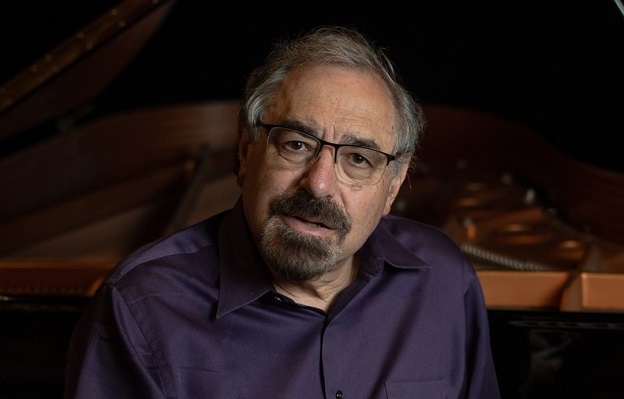Valentin Silvestrov, when I listen to your piece Triptych, I hear a lot of beauty and comforting, even kind of hope. Is that your way to compensate and to contrast with what is happening around us?
« When cannons speak, the muses fall silent »- this well-known aphorism holds true. But their silence stands as a condemnation of the vile and despicable acts that ‘geopolitical’ leaders have committed over millennia (and still commit today), destroying lives in the name of so-called higher goals. Yet nothing is higher than life itself.
In this world, music speaks of this truth through its silence. Music, as an expression of life, carries a quiet but potent protest against this destruction. It’s not merely a contrast but a declaration: that life, beauty, and hope endure, even when surrounded by chaos.
Triptych, then, can be interpreted as a voice for what truly matters—humanity, compassion, and the unyielding belief that life itself is sacred. Life is God, not the god in whose name this life is destroyed by the supreme scoundrels of all previous and present eras and nations.
 Maestro Berman, you are a close friend of the composer Valentin Silvestrov. How did this come?
Maestro Berman, you are a close friend of the composer Valentin Silvestrov. How did this come?
My association with Valentin Silvestrov goes back to the early 1960s, when I was a student at the Tchaikovsky Conservatory in Moscow. At that time, later called the Thaw, there emerged a group of young composers who took advantage of a relative liberalization of cultural politics in the Soviet Union. The iron curtain became a little more porous, and new styles and techniques used by western composers became known in Moscow. The young composers – Schnittke, Gubaidulina, Volkonsky, Denisov – were eagerly experimenting with new musical idioms. A group of young enthusiastic performers formed around this creative nucleus, and I was one of them. These composers established contact with the like-minded colleagues outside of Moscow – in Estonia (Arvo Pärt), Armenia (Tigran Mansourian), and Ukraine (Valentin Silvestrov). Through them I became acquainted with Silvestrov’s music and started performing it.
So, this relationship started when Silvestrov’s musical career was still in the avant-garde period.
His early compositions, though sounding ‘radical’ at that time, always displayed lyrical quality, as well as attention to minute musical gestures and nuances of sonority. Even the most avant-garde sounding works, like Elegy (1967), were not cerebrally calculated, but employed what Silvestrov called later « dodecaphony by ear ».
Having left the Soviet Union in 1973, I continued performing Silvestrov’s works including his later compositions in which he further expanded his stylistic range.
Did he ever confide why this change happened? Have you spoken with him about this?
With the start of the brutal Russian invasion of Ukraine in 2022 my thoughts turned to Silvestrov and his music. This is when I became intimately acquainted with his new style. I was fascinated by the change in his musical language. When I asked why he abandoned the radical style of his youth, Silvestrov insisted that the avant-garde did not disappear from his music, but rather penetrated his newer compositions like grains of salt. I decided to make a recording showing Silvestrov’s evolution in the past 60 years (see the Pizzicato review underneath). In my view, one can fully appreciate this composer only while considering his entire output. Working closely with him I became aware that his attention to minute details of dynamics, rubato, or pedaling became even more acute than before.
Do you think it was kind of a liberation for him, when he could compose according to his inner feelings and no longer according to a scheme which was dictated by those who declared themselves as the only representatives of contemporary music?
Silvestrov confided to me that he had been much happier ever since he abandoned the radical style. By nature he is calm and soft spoken, a spiritual man seemingly in peace with himself. The tragic events of the last two years shook him to his core.
https://www.pizzicato.lu/nur-nicht-verpassen-silvestrov-berman-musik-aus-sechs-jahrzehnten/



















